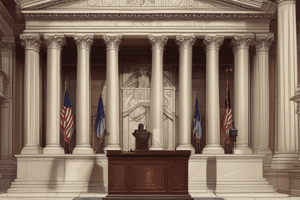Podcast
Questions and Answers
Federal judges serve lifetime terms.
Federal judges serve lifetime terms.
True (A)
What is guaranteed by the Constitution during criminal cases?
What is guaranteed by the Constitution during criminal cases?
Trial by jury
What does the diagram depicting cases reaching the Supreme Court illustrate?
What does the diagram depicting cases reaching the Supreme Court illustrate?
Appellate Jurisdiction
What is the final authority on legal questions in the United States?
What is the final authority on legal questions in the United States?
Which is the most likely reason the framers of the Constitution did not tell the judicial branch how to interpret the document? (Select all that apply)
Which is the most likely reason the framers of the Constitution did not tell the judicial branch how to interpret the document? (Select all that apply)
Under which jurisdiction would further review of a federal court decision fall?
Under which jurisdiction would further review of a federal court decision fall?
The selection of federal judges by the executive branch is an example of?
The selection of federal judges by the executive branch is an example of?
What is an unanswered constitutional question about the judicial branch?
What is an unanswered constitutional question about the judicial branch?
Why did the Constitution give Congress the power to create a system of federal courts?
Why did the Constitution give Congress the power to create a system of federal courts?
What does appellate jurisdiction refer to?
What does appellate jurisdiction refer to?
Flashcards are hidden until you start studying
Study Notes
Federal Judges
- Federal judges serve lifetime terms, ensuring judicial independence and stability in the legal system.
Constitutional Guarantees
- The Constitution guarantees trial by jury in criminal cases, protecting the right to a fair trial.
Court Jurisdiction
- Appellate jurisdiction occurs when cases are reviewed by a higher court, such as the Supreme Court.
Authority of the Supreme Court
- The Supreme Court represents the final authority on legal questions in the United States, influencing law and policy nationwide.
Framers' Intent
- The framers of the Constitution did not specify how the judicial branch should interpret the document to allow for independent judicial reasoning and adaptability to changing societal norms.
Jurisdiction Review
- Further review of federal court decisions falls under appellate jurisdiction, distinguishing it from original jurisdiction.
Checks and Balances
- The selection of federal judges by the executive branch exemplifies the system of checks and balances, preventing any one branch from becoming too powerful.
Judicial Terms
- A significant constitutional question about the judicial branch relates to the interpretation of what "good behavior" means for judicial terms, impacting removal processes for judges.
Congressional Authority
- The Constitution grants Congress the power to create a system of federal courts, anticipating the necessity for lower courts to handle cases before they reach the Supreme Court.
Understanding Appellate Jurisdiction
- Appellate jurisdiction grants the Supreme Court the authority to hear cases that have been appealed from lower courts, shaping legal interpretations and precedents.
Studying That Suits You
Use AI to generate personalized quizzes and flashcards to suit your learning preferences.




